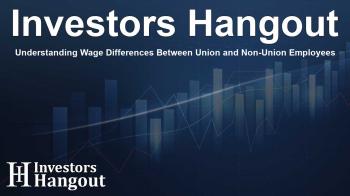Understanding Wage Differences Between Union and Non-Union Employees

A Manager's Dilemma on Employee Wages
A manager from Minneapolis sought advice on the “EntreLeadership” podcast, asking personal finance expert Dave Ramsey about the growing concerns over wage disparities between his union and non-union teams. The caller, AJ, is responsible for a group of about 10 staff members in an engineering company, comprising an equal split of union field engineers and non-union project managers.
Addressing Pay Inequities
AJ shared his observations that despite the different roles, some employees are troubled that union field engineers currently earn more than the project managers supervising them. He expressed his frustration, stating, "My project managers earn less than my field engineers," highlighting the unusual situation where the project managers, responsible for assigning tasks to field engineers, are not compensated fairly.
To clarify the distinction in roles, AJ explained, "The union comprises the field crews, while the non-union constitutes the project management team." Ramsey, in response, focused on the core of the issue, stating that pay differences are inherently tied to the nature of the work performed, regardless of unionization.
Wages Reflect Job Responsibilities
AJ recounted how the compensation structure has shifted over time, with project managers once earning more than their field engineer counterparts. This shift, as Ramsey pointed out, is not uncommon in the job market, stating, "Changes in technology and market demands often cause these fluctuations. Someone who used to earn more might find their pay rate affected by industry transformations."
The Marketplace Informs Compensation
Dave Ramsey emphasized that the most significant factor in determining wages is the compensation provided by the marketplace for specific positions. He stated, "It’s about what each role commands in the market, rather than employees' perceptions of fairness." He further elaborated, saying, "If a role in project management has a set pay structure, and the union field engineer has a different one, it comes down to qualifications and preferences. Most will follow the pay if they feel inclined toward that role, except in cases where they dislike the work."
In AJ's case, both the union and non-union positions are reportedly above market salary levels according to Ramsey. In this situation, Ramsey concluded, "There’s really no complaint to be made if the wages are competitive."
Pragmatic Business Strategies
Ramsey reinforced that his intention is not to undermine unions but rather to approach the issue from a business standpoint. He posed the question, "Why would I pay more if I could choose to operate without the union and reduce costs? That’s how my competitors are functioning."
When AJ sought further advice on how to communicate these wage disparities to his team, Ramsey provided straightforward guidance. He suggested simply stating, "This position commands this pay, and that other position commands a different pay. The differences are due to the marketplace norms, not personal choices made by anyone in the company."
If employees continue to express discontent, Ramsey advised that it might indicate issues beyond pay. "I shouldn't need to justify salary rates to someone who’s engaged. If they are still unhappy, there could be maturity issues or other factors at play within that individual," he remarked.
Frequently Asked Questions
What sparked the wage disparity discussion?
The discussion began when a manager raised concerns about the increasing pay gap between union and non-union staff in his engineering company.
What advice did Dave Ramsey give regarding pay differences?
Ramsey emphasized that wage differences are normal due to the varying responsibilities of each role and should be based on market rates not employee perceptions.
How should the manager communicate this situation to his team?
Ramsey suggested a straightforward explanation about the roles and their respective pay, reinforcing that these differences stem from market factors.
Why might employees feel dissatisfied despite above-market pay?
Dissatisfaction might emerge not from pay alone, but from personal feelings towards their roles or maturity related issues.
What does Ramsey think about unions in terms of business?
Ramsey does not aim to undermine unions but looks at the costs associated with maintaining them compared to operating without.
About The Author
Contact Riley Hayes privately here. Or send an email with ATTN: Riley Hayes as the subject to contact@investorshangout.com.
About Investors Hangout
Investors Hangout is a leading online stock forum for financial discussion and learning, offering a wide range of free tools and resources. It draws in traders of all levels, who exchange market knowledge, investigate trading tactics, and keep an eye on industry developments in real time. Featuring financial articles, stock message boards, quotes, charts, company profiles, and live news updates. Through cooperative learning and a wealth of informational resources, it helps users from novices creating their first portfolios to experts honing their techniques. Join Investors Hangout today: https://investorshangout.com/
The content of this article is based on factual, publicly available information and does not represent legal, financial, or investment advice. Investors Hangout does not offer financial advice, and the author is not a licensed financial advisor. Consult a qualified advisor before making any financial or investment decisions based on this article. This article should not be considered advice to purchase, sell, or hold any securities or other investments. If any of the material provided here is inaccurate, please contact us for corrections.

